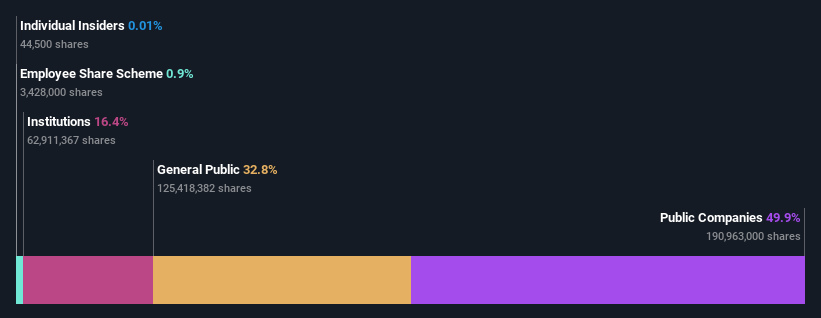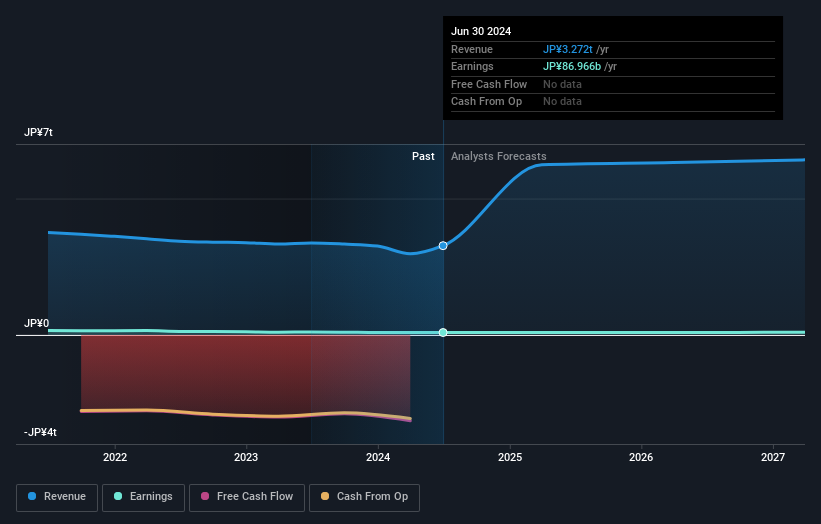Japan Post Insurance Co., Ltd.'s (TSE:7181) largest shareholders are public companies with 50% ownership, individual investors own 33%

Key Insights
- The considerable ownership by public companies in Japan Post Insurance indicates that they collectively have a greater say in management and business strategy
- 52% of the business is held by the top 2 shareholders
- 16% of Japan Post Insurance is held by Institutions
Every investor in Japan Post Insurance Co., Ltd. (TSE:7181) should be aware of the most powerful shareholder groups. And the group that holds the biggest piece of the pie are public companies with 50% ownership. That is, the group stands to benefit the most if the stock rises (or lose the most if there is a downturn).
Meanwhile, individual investors make up 33% of the company’s shareholders.
Let's delve deeper into each type of owner of Japan Post Insurance, beginning with the chart below.
Check out our latest analysis for Japan Post Insurance

What Does The Institutional Ownership Tell Us About Japan Post Insurance?
Many institutions measure their performance against an index that approximates the local market. So they usually pay more attention to companies that are included in major indices.
We can see that Japan Post Insurance does have institutional investors; and they hold a good portion of the company's stock. This can indicate that the company has a certain degree of credibility in the investment community. However, it is best to be wary of relying on the supposed validation that comes with institutional investors. They too, get it wrong sometimes. When multiple institutions own a stock, there's always a risk that they are in a 'crowded trade'. When such a trade goes wrong, multiple parties may compete to sell stock fast. This risk is higher in a company without a history of growth. You can see Japan Post Insurance's historic earnings and revenue below, but keep in mind there's always more to the story.

Hedge funds don't have many shares in Japan Post Insurance. Japan Post Holdings Co., Ltd. is currently the company's largest shareholder with 50% of shares outstanding. The Vanguard Group, Inc. is the second largest shareholder owning 1.9% of common stock, and Nomura Asset Management Co., Ltd. holds about 1.8% of the company stock.
To make our study more interesting, we found that the top 2 shareholders have a majority ownership in the company, meaning that they are powerful enough to influence the decisions of the company.
While it makes sense to study institutional ownership data for a company, it also makes sense to study analyst sentiments to know which way the wind is blowing. There are plenty of analysts covering the stock, so it might be worth seeing what they are forecasting, too.
Insider Ownership Of Japan Post Insurance
The definition of an insider can differ slightly between different countries, but members of the board of directors always count. The company management answer to the board and the latter should represent the interests of shareholders. Notably, sometimes top-level managers are on the board themselves.
I generally consider insider ownership to be a good thing. However, on some occasions it makes it more difficult for other shareholders to hold the board accountable for decisions.
Our most recent data indicates that insiders own less than 1% of Japan Post Insurance Co., Ltd.. Keep in mind that it's a big company, and the insiders own JP¥113m worth of shares. The absolute value might be more important than the proportional share. Arguably, recent buying and selling is just as important to consider. You can click here to see if insiders have been buying or selling.
General Public Ownership
With a 33% ownership, the general public, mostly comprising of individual investors, have some degree of sway over Japan Post Insurance. While this group can't necessarily call the shots, it can certainly have a real influence on how the company is run.
Public Company Ownership
Public companies currently own 50% of Japan Post Insurance stock. We can't be certain but it is quite possible this is a strategic stake. The businesses may be similar, or work together.
Next Steps:
It's always worth thinking about the different groups who own shares in a company. But to understand Japan Post Insurance better, we need to consider many other factors. Like risks, for instance. Every company has them, and we've spotted 2 warning signs for Japan Post Insurance (of which 1 makes us a bit uncomfortable!) you should know about.
If you are like me, you may want to think about whether this company will grow or shrink. Luckily, you can check this free report showing analyst forecasts for its future.
NB: Figures in this article are calculated using data from the last twelve months, which refer to the 12-month period ending on the last date of the month the financial statement is dated. This may not be consistent with full year annual report figures.
New: Manage All Your Stock Portfolios in One Place
We've created the ultimate portfolio companion for stock investors, and it's free.
• Connect an unlimited number of Portfolios and see your total in one currency
• Be alerted to new Warning Signs or Risks via email or mobile
• Track the Fair Value of your stocks
Have feedback on this article? Concerned about the content? Get in touch with us directly. Alternatively, email editorial-team (at) simplywallst.com.
This article by Simply Wall St is general in nature. We provide commentary based on historical data and analyst forecasts only using an unbiased methodology and our articles are not intended to be financial advice. It does not constitute a recommendation to buy or sell any stock, and does not take account of your objectives, or your financial situation. We aim to bring you long-term focused analysis driven by fundamental data. Note that our analysis may not factor in the latest price-sensitive company announcements or qualitative material. Simply Wall St has no position in any stocks mentioned.
About TSE:7181
Japan Post Insurance
Provides life insurance products and services in Japan.
Undervalued with acceptable track record.
Similar Companies
Market Insights
Community Narratives




